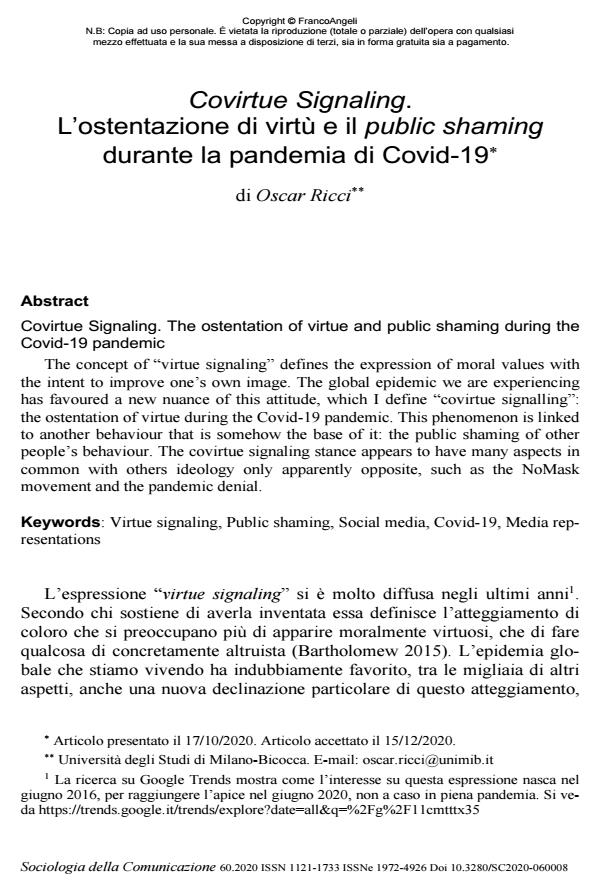Covirtue Signaling. The ostentation of virtue and public shaming during the Covid-19 pandemic
Journal title SOCIOLOGIA DELLA COMUNICAZIONE
Author/s Oscar Ricci
Publishing Year 2021 Issue 2020/60
Language Italian Pages 13 P. 82-94 File size 658 KB
DOI 10.3280/SC2020-060008
DOI is like a bar code for intellectual property: to have more infomation
click here
Below, you can see the article first page
If you want to buy this article in PDF format, you can do it, following the instructions to buy download credits

FrancoAngeli is member of Publishers International Linking Association, Inc (PILA), a not-for-profit association which run the CrossRef service enabling links to and from online scholarly content.
The concept of "virtue signaling" defines the expression of moral values with the intent to improve one’s own image. The global epidemic we are experiencing has favoured a new nuance of this attitude, which I define "covirtue signalling": the ostentation of virtue during the Covid-19 pandemic. This phenomenon is linked to another behaviour that is somehow the base of it: the public shaming of other people’s behaviour. The covirtue signaling stance appears to have many as-pects in common with others ideology only apparently opposite, such as the No-Mask movement and the pandemic denial.
Keywords: Virtue signaling, Public shaming, Social media, Covid-19, Media representations
- Barbera P., Vaccari C., Valeriani A. (2017), Social Media, Personalisation of News Reporting, and Media Systems’ Polarisation in Europe, in Barisione M., Michailidou A. (eds.) Social Media and European Politics. Palgrave Studies in European Political Sociology. Palgrave Macmillan, London.
- Barret R., Brown P. (2008), Stigma in the Time of Influenza: Social and Institutional Responses to Pandemic Emergencies, in «The Journal of Infectious Diseases», 197, pp. 34-37.
- Bartholomew J. (2015), I Invented “Virtue Signaling” Now It’s Taking Over the World, in «The Spectator», October 10.
- Boltanski L. (1993), La Souffrance à distance, Paris, Métailié; trad. it (2000) Lo spettacolo del dolore. Morale umanitaria, media e politica, Cortina, Milano.
- Boni F. (2020), Frammenti di un discorso virale. Le cornici del coronavirus, in «Mediascapes», 15, pp. 3-12.
- Brown L., Macintyre K., Trujillo L. (2003), Interventions to reduce HIV/AIDS stigma: what have we learned?, in «Aids Education and Prevention», 15, 1, pp. 49-69.
- Casiano I. C. (2020), Reframe the Shame: Accusing Others of “Quarantine Bragging” Downplays Resilience, testo disponibile in: -- https://psychcentral.com/blog/accusing-others-of-quarantine-bragging-downplays-resilience/
- Cato S., Iida T., Ishida K., Ito A., McElwain K.M., Shoji M. (2020), Social distancing as a public good under the COVID-19 pandemic, in «Public Health», Pre proof, Onlinefirst.
- Dal Lago A. (1999), Non-persone. L’esclusione dei migranti in una società globale, Feltrinelli, Milano.
- Douglas D. (2016), Doxing: a conceptual analysis, in «Ethics and Information Technology», 18, pp. 199-210.
- Douglas M. (1966), Purity and Danger. An Analysis of Concepts of Pollution and Taboo, Harmondsworth, Penguin; trad. It. (1975) Purezza e pericolo. Un’analisi dei concetti di contaminazione e tabù, Il Mulino, Bologna.
- Douglas M. (1992), Risk and Blame, London-New York, Routledge; trad. it. (1996) Rischio e colpa, Il Mulino, Bologna.
- Dunsby R., Howens L. (2018), The NEW adventures of the digital vigilante! Facebook users’ views on online naming and shaming, in «Australian and New Zealand Journal of Criminology», 52, 1, pp. 41-59.
- Esmoris M., Hijós N. (2020), Exposed bodies, open houses. Embodiment and domestic life during the pandemic scenario in urban middle classes in Buenos Aires, in «Cambio. Rivista sulle trasformazioni sociali», OpenLab on Covid-19.
- Girard R. (1982), Le bouc émissaire, Paris, Grasset & Fasquelle; trad. it. (1996) Il capro espiatorio, Adelphi, Milano.
- Lee S., Chan L., Chau A., Kwok K., Kleinman, A. (2004), The experience of SARS-related stigma at Amoy Gardens, in «Social Science and Medicine», 61, 9, pp. 2038-2046.
- Lewis S.E. (2020), Where are the photos of people dying of Covid?, testo disponibile in: -- https://www.nytimes.com/2020/05/01/opinion/coronavirus-photography.html
- MacPherson E., Kerr G. (2020), Online public shaming of professional athletes: gender matters, in «Psychology of Sport and Exercises», onlinefirst.
- Mauss M. (1923), Essai sur le don. Forme et raison de l’échange dans les sociétés archaïques, in «L’Année Sociologique (1896/1897-1924/1925)», 1, pp. 30-186; trad. it. (1965), Saggio sul dono. Forma e motivo dello scambio nelle società arcaiche, Einaudi, Torino.
- Mukherjee U. (2020), Rainbows, Teddy Bears and ‘Others’: The Cultural Politics of Children’s Leisure Amidst the COVID-19 Pandemic, in «Leisure Science», Onlinefirst.
- Nguyen A., Vu, H.T. (2019), Testing popular news discourse on the “echo chamber” effect: Does political polarisation occur among those relying on social media as their primary politics news source? In «First Monday», 24 (5), 6.
- Ronson J. (2015), So You’ve Been Publicly Shamed, Macmillan Publishers, London; trad. it. (2015) I giustizieri della rete, Codici Edizioni, Torino.
- Scarry E. (2001), On beauty and being just, Princeton University Press, New Jersey; trad. It. (2001) Sulla bellezza, Il Saggiatore, Milano.
- Shariatmadari, D. (2016), Virtue-signalling – the putdown that has passed its sell-by date, in «The Guardian», January 20.
- Snyder J. (2020), Backlash against naming and shaming: The politics of status and emotion, in «The British Journal of Politics and International Relations», Online first, 3 settembre.
- Sonnevend J. (2020), A virus as an icon: the 2020 pandemic in images, in «American Journal of Cultural Sociology», onlinefirst.
- Tenkorang E. (2017), Ebola-related stigma in Ghana: Individual and community level determinants, in «Social Science and Medicine», 182, pp 142-149.
Oscar Ricci, Covirtue Signaling. L’ostentazione di virtù e il public shaming durante la pandemia di Covid-19 in "SOCIOLOGIA DELLA COMUNICAZIONE " 60/2020, pp 82-94, DOI: 10.3280/SC2020-060008